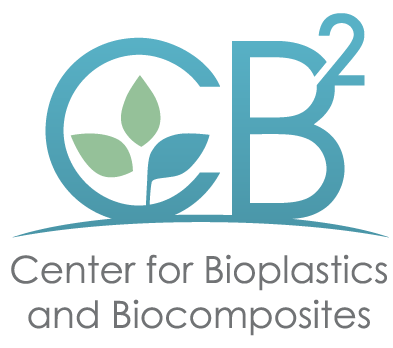NSF funds Center for Bioplastics and Biocomposites for Phase II

The Center for Bioplastics and Biocomposites (CB2), co-located at North Dakota State University (NDSU; lead site), Iowa State University (ISU), Washington State University (WSU), and the University of Georgia (UGA), has been awarded Phase II of a National Science Foundation (NSF) Industry-University Cooperative Research Centers Program (I/UCRC) grant. This new funding, along with contributions from industry partners, will total $1,950,000 and will be shared among the four collaborating universities that comprise CB2.
The U.S. bioplastics industry is growing at a rate of 10 to 20% annually, which is higher than the growth rate of the traditional petroleum-based plastics industry. This rapid growth has created an interest among many industry partners in leveraging research efforts to accelerate the development of bioplastic and biocomposite products. CB2 is a 5-year project that aims to leverage this opportunity by focusing on developing high-value biobased products from agricultural and forestry feedstocks for industry partners.
CB2 develops fundamental knowledge related to bioplastics and biocomposites, and disseminates research-based findings that promote sustainability to industry partners. At the same time, the center helps undergraduate and graduate students learn the skills needed to become tomorrow’s bioplastics scientists. More than 30 industry partners, including Ford, Amazon, 3M, John Deere, Sherwin-Williams, Kimberly-Clark, AkzoNobel, ADM, Hyundai, and BASF, define and mentor research projects at the four CB2 sites.
“It has been great working with the four sites and 30+ member companies over the last seven years, and I am more than excited move to the next phase and see all of the great new sustainable technologies the researchers and industry partners will develop,” said David Grewell, PhD, founder/director of CB2 and chair of the NDSU Department of Industrial and Manufacturing Engineering.
As CB2’s lead institution, NDSU is responsible for overall operation of the center, led by Grewell; the NDSU site director is Dean Webster, PhD, chair of the Department of Coatings and Polymeric Materials. The other member institutions are: the biopolymers & biocomposites research team at Iowa State University (site director/co-director: Eric Cochran, PhD/Nacu Hernandez); the Composite Materials and Engineering Center at Washington State University (site director/co-director: Vikram Yadama, PhD/Hang Liu, PhD); and the New Materials Institute at the University of Georgia (site director: Jason Locklin, PhD).
Each CB2 site has a unique specialty. NDSU builds upon the university’s long history of thermosetting polymer systems and applications, such as coatings and composites; Iowa State works on thermoplastics and polymers processing; Washington State University researches and develops bio-based composite materials for infrastructure applications. The UGA team develops biologically-sourced and -degraded materials, that are compostable in industrial and natural receiving environments, for single-use packaging and consumer goods applications.
The goals for Phase II of the project are:
- Expand the knowledge and develop the science for recycling and end-of-life treatment of sustainable materials, in particular as they are mixed with petrochemical plastics.
- Expand membership by engaging additional companies that have expressed a need for recycling and end-of-life treatment.
- Develop fundamental knowledge on sustainable materials.
- Prepare students to join the workforce equipped with the knowledge and skills required by industry.
For more information about CB2, see: https://www.ndsu.edu/centers/cb2/
Phase II of the NSF I/UCRC grant is supported by NSF award 2113804.
